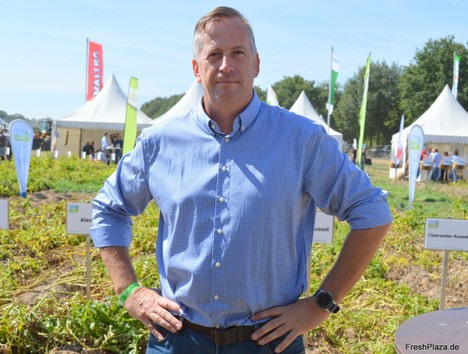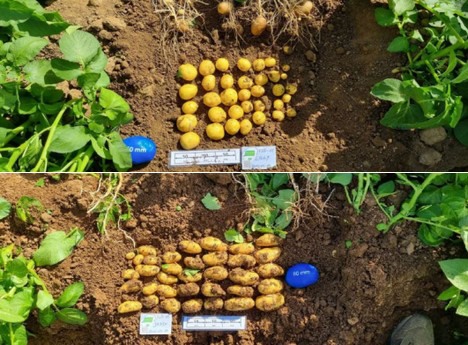With the exception of 2018, Spain has been experiencing a decidedly low-precipitation decade. "Last year, depending on the area, there was still just enough irrigation water and there had also been enough rain for potato production. This is why it was possible to ensure the customary early potato production. However, last year's restrictions on the amount of irrigation water from the state water infrastructure have been significantly increased once again, making early potato production impossible without wells or sufficient rainfall," says Georg Kolmhofer from Seville-based potato company Sesur.
The production intended for export is normally grown in the weeks around Christmas. In the current season, however, much of the land was not planted until late January. "Due to demand from the buyer, some areas were also planted in November to ensure delivery as early as April," Kolmhofer continues.

Georg Kolmhofer (shown here at Weuthen Potato Day 2022) has been living and working in Seville, southern Spain, for many years. In addition to marketing early potatoes, the Austrian native devotes himself to variety trials conducted on behalf of well-known potato breeding companies in southern Spain.
Minimal frost damage
From mid-December to the present, about 40 mm of precipitation has been recorded. At the end of January to the beginning of March, night temperatures dropped to 0º C several times. Kolmhofer: "Apart from the very few early planted areas, there was no significant frost damage. However, growth was very slow due to low night temperatures and lack of precipitation."
Starting in March, daytime highs between 25-30º C are observed in the Seville area, with irrigation. "You can watch the plants grow under these conditions and it's also worth noting that the current plants are not threatened by late blight due to the lack of precipitation, lack of morning dew and the switch to drip irrigation."
 Potato cultivation in southern Spain. In terms of price, the Spanish export product is somewhat more expensive than Egyptian goods and at about the same level as Israeli goods.
Potato cultivation in southern Spain. In terms of price, the Spanish export product is somewhat more expensive than Egyptian goods and at about the same level as Israeli goods.
Export loses importance in favor of the domestic market
Due to a lack of irrigation possibilities, early potato cultivation in the Seville area has seen a reduced acreage. According to Kolmhofer, this mainly affects the early areas south of Seville, which hardly have wells. "Nevertheless, the plants have already almost made up for the shortfall because of later time period as well as perfect weather, and the stocks are extremely healthy. In addition, in recent years we have observed a strong change in early potato cultivation from the so-called 'export varieties' to varieties for the Spanish domestic market," the potato merchant says about the increasing importance of the domestic market.
"Due to several factors, such as fixed prices, sales security, easier claims (analyses and certifications) and higher-yielding varieties, the Spanish domestic market is now more attractive to many potato growers. The requirement profile of the German and Central European retailers simply cannot be met by everyone."
He said the relatively small acreage to be cleared in April had been destroyed by frost and some tubers had been replanted. If weather conditions remain stable, he said, the first clearings of the main areas of stable produce can be expected by mid-to-late May. "Just as in the rest of Europe, demand for good, washable product is high in Spain. At the moment, residual volumes of reasonable tubers from France are still being used, but these were supplemented with Spanish winter potatoes at the turn of the year until March. For more than a month, the company has also been actively sourcing from North Africa and Israel. There should be room for all origins in the export business," Kolmhofer concludes.
For more information:
Georg Kolmhofer
SESUR Semilla y Exportación SLU
Apdo. de correos 20.008
41020 Sevilla - Spain
T: +34 954 610012
F: +34 954 303051
[email protected]
www.sesur.net










